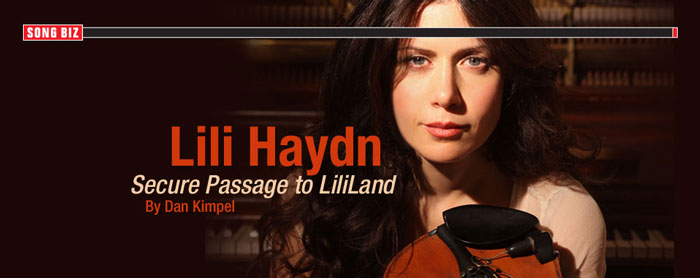 A classically trained violinist who has played with Jimmy Page and Robert Plant, Sting, Josh Groban and George Clinton’s P-Funk; an accomplished film composer, an ethereal vocalist and a singer/songwriter with four prior albums: Lili Haydn, the daughter of the late stand-up comic Lotus Weinstock and ‘60s “Acid King” David Jove, was a child actress in feature films and television series prior to her music career.
A classically trained violinist who has played with Jimmy Page and Robert Plant, Sting, Josh Groban and George Clinton’s P-Funk; an accomplished film composer, an ethereal vocalist and a singer/songwriter with four prior albums: Lili Haydn, the daughter of the late stand-up comic Lotus Weinstock and ‘60s “Acid King” David Jove, was a child actress in feature films and television series prior to her music career.
Her newest release, LiliLand, signals her return after a five-year ordeal when her house almost made her insane. Brain-deadening chemicals from a pesticide in the foundation of the structure caused toxic inebriation that robbed her of the ability to write lyrics.
She evacuated the house, practiced her violin every day and eventually regained her powers. “I always knew that music was healing,” she says. “Music is a comprehensive holistic neurogenitive process, the most effective form of neurotherapy that exists today.”
As Haydn recovered she earned valuable insight. “I got more committed to making sure that music was a part of my life, and part of other people’s lives. Because it is so important to have music in schools and to continue music as people get older. I turned to some of the other suffering that I saw in the world and I was affected by more than ever because I had my own issues.”
Recording at her studio in Hans Zimmer’s Remote Control complex in Santa Monica, Haydn enlisted drummer Matt Chamberlin and bassist Itai Disraeli. “I thought this record was done several times,” she says. “But it needed more life, drive and masculinity.”
A musical motif that is prominent in Haydn’s new songs is a circular melodic line. “It is called an ‘Ostinato,’” she explains. “I fell in love with the compositions of Steve Reich, Philip Glass and Peter Gabriel and the patterns that go round and round. The hypnotic factor was a place where I could find myself that was very healing. It became the terrain of LiliLand.”
During her five-year process of affliction and recovery, Haydn continued to score films. “My melodic sensibility was intact, but I didn’t have the lyrics to go along with it,” she says. With her latest songs, the words are strikingly original; witness Haydn’s inspiration for “God Said” as she explains, “The president of NestlО said that water is not a human right, it is a commodity.” The narrative in the song references the Saffron Revolution, when Buddhist monks in Myanmar (Burma) stood up to the ruling junta.
The ambitious song “Sea of Gold” was given to Haydn in an instant of vivid inspiration. “I was watching author Joseph Campbell, and he was talking about Carl Jung working with a patient who was very introverted. And she had a dream that she was lying on a bed of rocks, and inside of the rocks were trapped all of her treasures. And as she began to feel more connected to people, she had another dream where the rocks opened up and she painted a picture. And the gold was coming out of the rocks.”
Haydn says that with her healing, it was time to rejoin the world and not hide. “With this song I imagined the gold from the rocks pouring into a ‘Sea of Gold’ where we would connect. To be more personal, it would help me share my music with people in a bigger way and not get trapped behind the barriers of my psyche.”
She concludes that similar sparks of information drove much of the process. “Because I was doing film music, I was being guided by other people’s needs, responding their direction, art and inspiration. I would get into my studio at the end of the day and just fuck around and most of this came from this longing to play and have fun with music.”
Haydn’s vision is illuminated in the richness of the textures, the pulsating imagery and the vibrant alchemy that glows within the charmed sonic landscape of LiliLand. “I am always drawn to both intensely emotional and playful stuff,” Haydn concludes. “That’s what life is like when it’s rich.”









